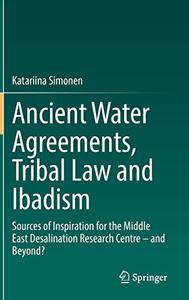
Ancient Water Agreements, Tribal Law and Ibadism: Sources of Inspiration for the Middle East Desalination Research Centre - and Beyond? by Katariina Simonen
English | PDF,EPUB | 2021 | 198 Pages | ISBN : 3030852172 | 6.2 MB
This book traces the development of Oman's inclusive agreements and highlights their importance for international negotiations, dealing with issues most relevant to humanity's own survival today, nuclear weapons or climate change.
In Oman, a historical seafaring nation on the south-eastern corner of the Arabian Peninsula, a culture of agreement that accommodates the interests of everyone has developed around the division of scarce water resources.
Life in the arid inland of the Omani Hajar mountains would not have been possible without water. Irrigation channel (falaj) construction is extremely old and skilful therein. Local practices evolved around the division of water and land on the basis of fairness. The community would be best served by inclusion and the avoidance of conflict.
A specific Islamic school called Ibadi arrived at Oman early on in the eighth century. Ibadi scholars conserved local practices. Consultation and mediation by sheikhs and the religious leader, Imam, became the law of the land. The Omanis were known as the People of Consultation, Ahl Al Shura.
In time, the practice of inclusive agreements would extend far beyond the village level, affecting Oman´s foreign policy under Sultan Qaboos. Oman´s water diplomacy succeeded in uniting the contestants of the Middle East Peace Process in the 1990s to work together on common problems of water desalination.
Buy Premium From My Links To Get Resumable Support,Max Speed & Support Me



